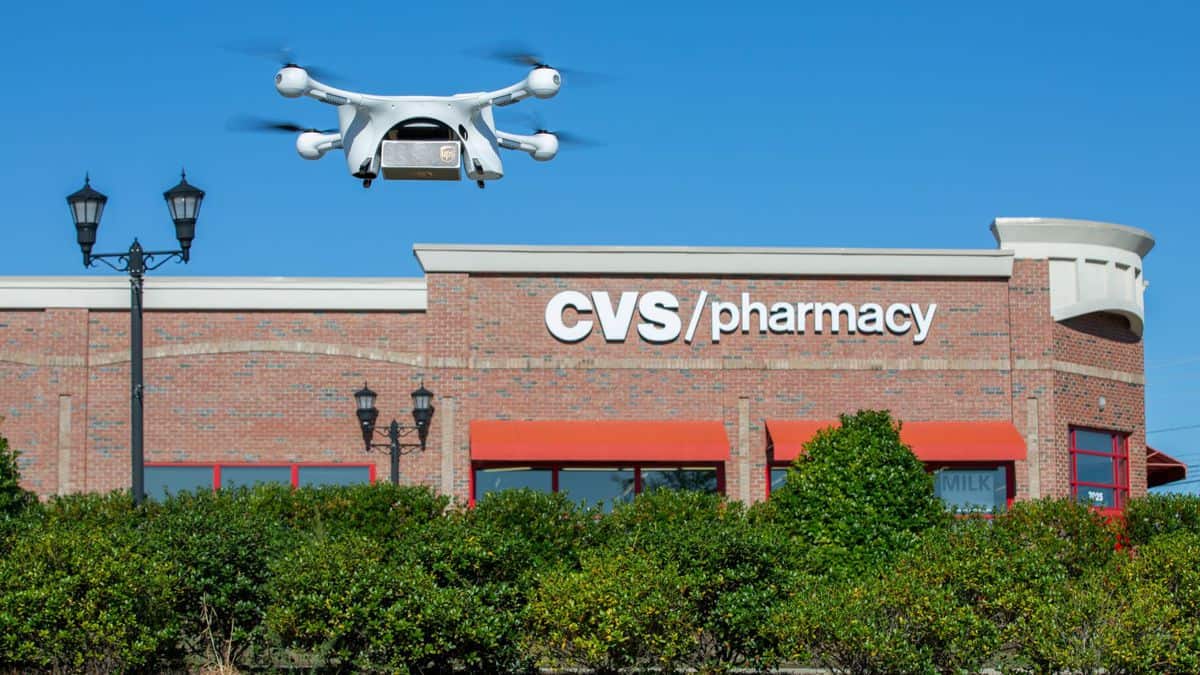Drones are proving to have many useful applications during a pandemic, not the least of which is delivering goods to minimize physical interaction and the spread of the coronavirus.
UPS (NYSE: UPS) on Monday said it will use a Matternet M2 drone system to make short-distance deliveries of prescription medications from a CVS Health Corp. (NYSE: CVS) pharmacy to The Villages in Florida, the largest U.S. retirement community and home to more than 135,000 residents.
Older people are more vulnerable to the serious effects of the COVID-19 disease, so providing a convenient alternative to visiting the pharmacy reduces their risk, as well as risk to those in stores they might come in contact with.
Flight Forward, the UPS drone delivery subsidiary, in November made its first commercial deliveries of prescription drugs in North Carolina from a CVS store to customers’ homes using the M2 autonomous aerial technology developed by Matternet. The deliveries followed Federal Aviation Administration approval to operate unlimited drone flights. The operator was able to keep the unmanned aerial system within sight at all times. UPS and Matternet also rush blood and swab samples across WakeMed Health & Hospitals’ campus. They performed more than 3,700 flights in 2019.
The new service in The Villages will begin in early May, with authority to operate through the pandemic. The operation could expand to include deliveries from two additional CVS pharmacies in the area. An extension of the program is possible if a need remains, UPS said.
“Now more than ever, it’s important that our customers have access to their prescriptions,” said Jon Roberts, CVS Health chief operating officer, in a statement. “In addition to our in-store pickup, free delivery services and drive through pickup, this drone delivery service provides an innovative method to reach some of our customers.”
The first flights will be less than one-half mile and land near the retirement community. Initially, a ground vehicle will complete the delivery to the residents’ home, UPS said.
Technology and health care experts are exploring how to use unmanned aerial and ground-based vehicles during a pandemic, including for:
- Delivery of supplies to front-line health care workers.
- Transport of test results to labs.
- Delivery of medicines and meals to quarantined individuals.
- Spraying disinfectant in public areas.
- Serving as mobile public speakers to inform people of safety measures and tips.
- Patrolling high-risk areas with photoelectric sensors to enforce curfews.
- Monitoring the health of people with heat signature, infrared cameras or computer vision systems that can check temperature, heart and respiratory rates.
Earlier this month, UPS Flight Forward announced it participated in tests with the U.S. government, the Virginia Center for Innovative Technology, and drone technology companies Drone Up and Workhorse Group to determine how drone systems can assist medical professionals in stopping the spread of the coronavirus. Among the use cases explored were picking up lab specimens and test kits.
The tests focused on safety, sorting out right-of-way for vehicles in the air, developing processes, policies and training for safe day/night operations, and proposed policy changes that would enable further use of unmanned aerial systems.
“We’ve proven through ongoing commercial drone delivery programs that effective drone delivery of medical products is faster than conventional ground-based transportation,” said Scott Price, UPS chief strategy and transformation officer, in a statement.
Data collected during the fast-paced simulation will be used to determine how private-sector drone operators can effectively supplement emergency response and certain patient care. The findings and recommendations will be included in a report to the White House.











